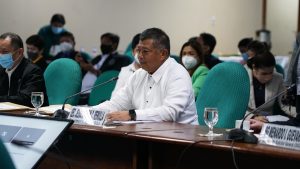The Philippine delegation to the fourth cycle of the country’s Universal Periodic Review in Geneva has assured United Nations member states that the government of President Ferdinand Marcos Jr. is committed to upholding human rights.
Last week, Justice Secretary Jesus Crispin Remulla delivered the country’s UPR report which enumerated the reforms undertaken by the government over the last five years.
“We will dispel the mistaken notion that there is a ‘culture of impunity’ in our country. We will not tolerate the denial of justice nor any violation of human rights,” he said in his prepared speech.
Remulla denied that there has been a systematic crackdown on opposition forces. “Let me say this in no uncertain terms: There is no state policy to attack, harass or intimidate human rights defenders, including environmental rights defenders, lawyers and other practitioners of the legal profession, and the media,” he said.
He was seemingly referring to the recent report released by the U.N. Human Rights Committee which noted the decline of human rights protection under the previous government of Rodrigo Duterte, whose term as president ended on June 30.
The recommendations in the U.N. committee report were echoed by scores of states that intervened in the Philippines’ UPR. A total of 107 states spoke during the UPR session with almost half of them highlighting the concerns raised by U.N. human rights experts. Around 35 countries called on the Philippines to put a stop to extrajudicial killings; 38 countries called for the protection of human rights and indigenous defenders, lawyers and judges, environmentalists, and journalists; and five countries called for an end to red-tagging, a practice by which individuals and organizations are branded by authorities as fronts of the Communist Party. Sierra Leone made a bold recommendation that the Philippines abolish the National Task Force to End Local Communist Armed Conflict, which was created by the Duterte government and became a notorious machinery for red-tagging opposition forces.
Civil society groups at the UPR welcomed the intervention of member states. “This clearly indicates that the world knows the real situation despite lies, empty rhetoric, and distortion of facts by the Philippine government delegation,” said the human rights group Karapatan. “The Philippine government delegation brought nothing but empty words and vague promises to the review. Its presentation did not reflect realities on the ground.”
In response, Remulla asserted that the term red-tagging is a mere invention of Filipino Leftists and is intended to protect the Left. It is also noteworthy to mention that the government report to the UPR mentioned a narrative about “human rights defense as an entitlement only to those who do not advocate or resort to violent extremism to reform society.” While it doesn’t explicitly state that it adheres to this doctrine, it is consistent with the messaging of the government’s anti-communist task force which demonizes the work of activists and civil society groups by linking them with groups espousing armed struggle.
During his closing remarks, Remulla reiterated the commitment of the Marcos government to actively work with the U.N. in improving the human rights situation in the Philippines.
After his return from Geneva, Remulla reported that the Philippines accepted 200 out of the 289 recommendations U.N. member states gave during the UPR. Remulla explained in a radio program that the government is not inclined to welcome proposals to legalize divorce, abortion, and same-sex marriage because they contradict the beliefs of the country’s Catholic population. He reminded U.N. member states to reconsider some of their recommendations, especially those that are supposedly inappropriate given the country’s social and political context.
In another media interview, Remulla also stated that it is unlikely that the Philippines will rejoin the International Criminal Court, which is investigating Duterte officials for committing grave crimes against humanity as part of the administration’s “war on drugs.” He also repeated his earlier argument that the local justice system can effectively prosecute those involved in killing innocent drug suspects.
The UPR is an ongoing process and the real test for the Marcos government is whether it will back its promises with sustained action and implementation of substantial governance reforms. Marcos cannot do this without reversing the numerous repressive policies of his predecessor, who is incidentally his political ally and the father of his vice-presidential running mate. If he is serious about promoting human rights, he should be ready to antagonize Duterte and the well-entrenched officials of the previous government who are suspected of being responsible for some of the bloodiest human rights abuses in recent years.

































